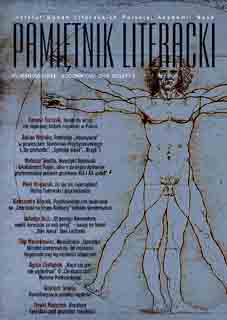Podmioty „intensywne” w powieściach Stanisława Przybyszewskiego („De profundis”, „Synowie ziemi”, „Krzyk”)
“Intensive” Subjects in Stanisław Przybyszewski’s Novels (“De Profundis,” “Synowie ziemi” <“Sons of the Earth”>, “Krzyk” <“Scream”>)
Author(s): Adrian MrówkaSubject(s): Language and Literature Studies, Studies of Literature, Polish Literature
Published by: Instytut Badań Literackich Polskiej Akademii Nauk
Keywords: Przybyszewski; De profundis; Synowie ziemi; Krzyk; Gilles Deleuze and Felix Guattari's theory; nervous rhisome; collective rhisome; temporal rhisome; short memory;
Summary/Abstract: The author of the article is interested, first of all, in the figure of Przybyszewski, which is perfectly described by the terms “homo viator [wanderer]” and “homo irrequietus [man driven by anxiety].” Second of all, the author attempts to study the cases of identity produced by “the brilliant Pole.” Mrówka analyses Przybyszewski’s three novels: "De profundis", "Synowie ziemi" ("Sons of the Earth"), and "Krzyk" ("Scream"). The novels’ protagonists, as Mrówka ascertains, are linked by a common subject construction which he calls “intensive.” It is proven that the protagonists without any special resistance toss and turn, which means that they try, as if unwittingly but persistently, to “slip out of” language that strives to “name,” “pin” and “mercantilize” them. Third of all, the author is curious about the category of the writing subject revealed from Przybyszewski’s texts which, as he acknowledges, is constituted by “short memory” – forgetting as a process – inseparable from nervous, collective and temporal rhizome (according to Gilles Deleuze and Félix Guattari’s theory).
Journal: Pamiętnik Literacki. Czasopismo kwartalne poświęcone historii i krytyce literatury polskiej
- Issue Year: 2016
- Issue No: 2
- Page Range: 19-46
- Page Count: 28
- Language: Polish

